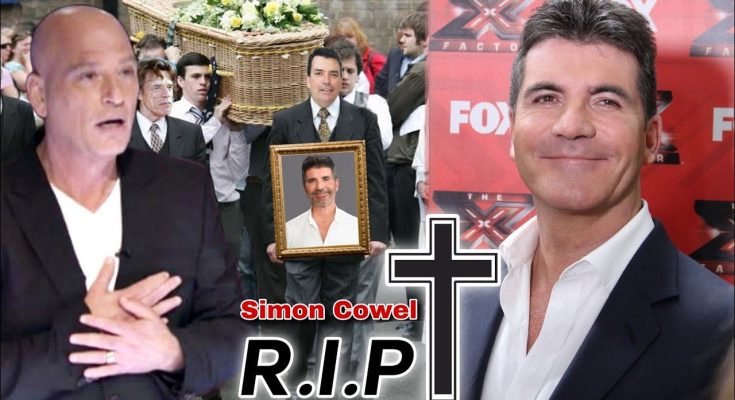🎬At Simon Cowell’s Last Rites! Howie Mandel and thousands of people couldn’t hold back their tears 😭😭

Simon Phillip Cowell was born on 7 October 1959[7][8] in Lambeth, London, and raised in Elstree, Hertfordshire. His mother, Julie Brett (née Josie Dalglish, 1925–2015),[9] was a ballet dancer and socialite, and his father, Eric Selig Phillip Cowell (1918–1999), was an estate agent, property developer, and music industry executive.[10] Cowell’s father was from a mostly Jewish family (his own mother was born in Poland),[11] though he did not discuss his ancestry with his children. Cowell’s mother was from a Christian background.[11][12] He has a younger brother, Nicholas Cowell; three half brothers, John, Tony, and Michael Cowell; and a half sister, June Cowell.[13] Cowell attended Radlett Preparatory School and the private Dover College, as did his brother, but left after taking GCE O levels. He passed English Language and Literature and then attended Windsor Technical College, where he gained another GCE in Sociology.[14] Cowell took a few menial jobs—including, according to his brother Tony,[15] working as a runner on Stanley Kubrick’s 1980 horror film The Shining—but did not get along well with colleagues and bosses, until his father, who was an executive at EMI Music Publishing, managed to get him a job in the mail room. However, after failing to get a promotion, he left to try out other jobs before returning to EMI. In the early 1980s, Cowell left EMI to form E&S Music with his former boss at EMI but quit in 1983.[17] He then formed Fanfare Records with Iain Burton, initially selling exercise videos, and music from acts such as the Italian orchestra Rondò Veneziano.[18][19] He had his first hit song in 1986 with “So Macho” by Sinitta. Some of Cowell’s early success came through Stock Aitken Waterman, who produced a number of hits in the 1980s.[20][21] However, in 1989 the company went under and he nearly became bankrupt. He then found a job with BMG as an A&R consultant and set up S Records under BMG.[23][24] He restarted his career in the music business by creating novelty records with acts such as the puppets Zig and Zag, Power Rangers and World Wrestling Federation.[25] In 1995, through his persistence, he persuaded two actors, Robson Green and Jerome Flynn from the UK television drama series Soldier Soldier, to sign with him and record the song “Unchained Melody”, which they had performed on the show.[26] The recording by the duo, now named Robson & Jerome, quickly reached number 1 in the UK, staying at the top of the chart for seven weeks.[27] It became the best-selling single of 1995, and their self-titled album released later in the year also became the best-selling album of 1995.[28] They released another album and two more singles before disbanding, and sold 7 million albums and 5 million singles in total.[29] According to Cowell, they made him his first million.[30] Later acts he signed included Five, Westlife and Teletubbies. In 2001, Cowell was given the role of judge on the first series of Pop Idol, a show that he and the show creator Simon Fuller successfully pitched to ITV Controller of Entertainment Claudia Rosencrantz.[33] Maggie Brown in The Guardian states, “the show became a seminal reality/entertainment format once on air that autumn”.[32] Cowell’s S Records signed the top two finishers of the first season of Pop Idol, Will Young and Gareth Gates, both of whom went on to have No 1 UK hits, and they were the top 2 best-selling singles of 2002 and the decade of 2000s.[34] He also became a judge on the first season of American Idol in 2002. With his notoriously critical reputation, Cowell has been likened to TV personalities such as Judge Judy and The Weakest Link host Anne Robinson.[35] His closest predecessor was British TV critic Nina Myskow who, in the 1980s, became known for her harsh put-downs in New Faces, a talent show that Cowell cited as an influence.[36][37] Cowell’s prominence grew, fed by his signature phrase, “I don’t mean to be rude, but …”, inevitably followed by an unsparingly blunt appraisal of the contestant’s talents, personality, or even physical appearance. A lot of these one-liners were the product of coaching that Cowell received from publicist Max Clifford.[38] Cowell also appeared on the one-off World Idol programme in 2003, in which it became clear that each country’s version of the Idol had attempted to come up with its own “Simon Cowell” type personality.
Tr



